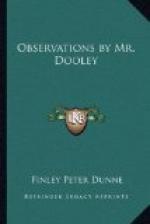“Th’ Boers niver raycovered fr’m th’ tur’ble blow. Their spirits was crushed. Their hopes had fled. Th’ kindergartens had opened an’ manny iv their bravest warryors had been carried off be their mothers. Anny moment they might be surrounded an’ surrindhered to. So wan mornin’ th’ entire mighty army, th’ whole thirty-two iv them, histed th’ white flag an’ presinted their bill.”
“An’ so th’ war is over?” asked Mr. Hennessy.
“On’y part iv it,” said Mr. Dooley. “Th’ part that ye see in th’ pitcher pa-apers is over, but th’ tax collector will continyoo his part iv th’ war with relentless fury. Cav’lry charges are not th’ on’y wars in a rale war.”
Newport
“About this time ivry year,” said Mr. Dooley, “I go to Newport f’r th’ summer.”
“Ye go where?” asked Mr. Hennessy.
“I go to Newport,” said Mr. Dooley, calmly, “in th’ pa-apers. Newport’s always there. I may not find annything about th’ fire at th’ yards or th’ war in th’ Ph’lippeens, but if Mrs. Rasther opens a can iv salmon or pounds th’ top off an egg, it’s down in black an’ white be th’ fearless hands iv th’ iditor. ’Tis a gr-reat joy bein’ lithry an’ knowin’ how to read. Th’ air is hot in Ar-rchey Road; ye can see it. It looks an’ feels like hot soup with people floatin’ around in it like viggytables. Th’ smoke poors fr’m th’ chimbly iv th’ rollin’ mills an’ comes right down on th’ sthreet an’ jines us. People ar-re lyin’ out iv doors with their mouths open. They’se a gr-reat dale iv cholery infantum an’ a few deleeryam thremens. If I cudden’t read I’d be hot about th’ weather an’ things. But whin th’ day is darkest an’ I don’t want to see me best cukkin’ frind, I takes me yacht at th’ top iv page eight an’ goes sailin’ off to Newport in me shirt sleeves with twelve inches iv malt in th’ hook iv me thumb, an’ there I stay till I want to come back an’ rest.




